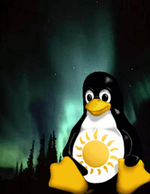Aurora SPARC Linux
Aurora SPARC Linux is an operating system, based on Fedora Core, for SPARC-based computers. Aurora was originally created after Red Hat dropped support for the SPARC architecture after Red Hat Linux 6.2.
 | |
| Developer | Aurora SPARC Linux Project |
|---|---|
| OS family | Unix-like |
| Working state | Abandoned. Superseded by Fedora SPARC[1] |
| Source model | Open source |
| Latest release | Build 2.0 (FC3) / April 14, 2006 |
| Update method | Yum |
| Package manager | RPM Package Manager |
| Platforms | SPARC |
| Kernel type | Monolithic kernel |
| Default user interface | GNOME |
| License | Various |
| Official website | auroralinux.org (from archive.org) |
The name derives from the internal Sun codename for the SPARCStation 5 chassis.
Since Aurora is derived from Fedora, and most of its developers are located in the US, it only maintains packages legally distributable in the United States.
Feature
- Aurora contains special utilities that are specific to the SPARC hardware line, such as audioctl, lssbus, silo.
- While SPARC has supported 64-bit processing since the ULTRA series, the SPARC distribution uses a 32-bit kernel.
Version history
Like Fedora (and Red Hat Linux before that), Aurora names all of its releases.
| Version | Name | Date |
|---|---|---|
| Build 0.1 | ? | 2001-11-05 |
| Build 1.0 (stable, based on Red Hat Linux 7.3) | Ansel | 2003-01-19 |
| Build 1.91 | Wombat | 2004-05-29 |
| Build 1.92 | Tangerine | 2004-11-20 |
| Build 2.0 (stable, based on Fedora Core 3) | Kashmir | 2006-04-14 |
Repositories of extra software
Like Fedora Core, Aurora only includes a core set of packages. For downloading and installing programs or codecs not distributed with Aurora, there are several repositories available.
Official repositories
Currently only Aurora Extras has an official status. This repository supports the currently released version of Aurora SPARC Linux Build 2.0. Aurora Extras is maintained by a group of volunteers. As a link to Extras is currently included in the base distribution, no extra configuration is required to enable it.
See also
References
- "[Aurora-sparc-user] Fwd: [Fedora-sparc] SPARC Status update". Aurora Mailing List. 8 April 2010. Retrieved 7 September 2012.